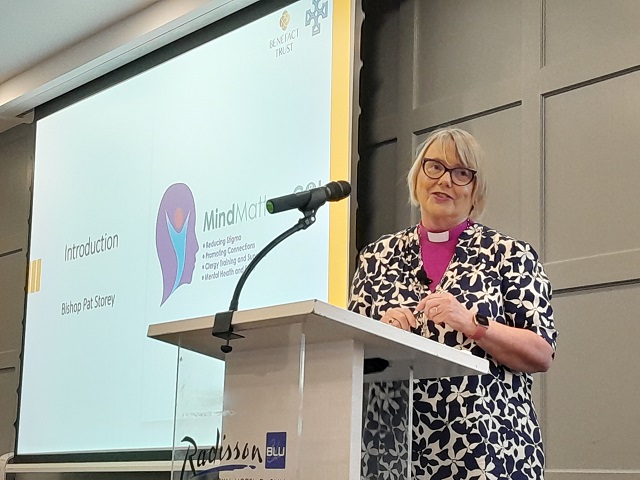Bishop Pat Storey on encouraging open conversations and reducing stigma.
Bishop Storey, who chairs the MindMatters project team and advisory group, expressed her joy at seeing MindMatters develop and culminate in the gathering (on Friday, 20th October) at Dublin’s Radisson Blu Royal Hotel.
“Positive mental health is a journey, not a destination, and a journey that we tend to travel very quietly,” Bishop Pat Storey reflected as she introduced the proceedings for the recent MindMatters COI conference. “And yet there can be healing,” she added, “so that’s why reducing stigma is the overall purpose of MindMatters. And we hope that in addressing issues around mental health, at the very least we’ll be demonstrating that it’s good to talk.”
“Often those who struggle with poor mental health feel like failures as people of faith,” she noted. “We feel we should be well, we should have joy. As a community of faith, we’re meant to have wonderful good news to share – and we have good news to share – but perhaps our good news is the courage to face another day. Perhaps our good news is the resilience to put one foot in front of the other. Perhaps our good news is our perseverance when we want to pull the duvet over our head.”
While there probably wasn’t a family in Ireland that hadn’t experienced poor mental health, the issue is often a hidden one. “We don’t hide our broken legs or our cuts and bruises,” Bishop Storey commented. “We don’t even hide our broken hearts but so often we hide away our struggles with anxiety, depression or stress. There are times when religious faith really helps in that struggle, and frankly there are times when it can make you feel worse.”
So how should Christians respond? The comfort of the Scriptures, the fellowship of our church community, and the direct comfort of our wonderful God and his creation were among the ways in which faith can help. Research for MindMatters, drawing on feedback from members of the Church of Ireland, indicated that personal connections, pastoral support from clergy, and medication (where required) also have a role – and, principally, being willing to talk about it and “knowing you’re not alone” made a positive difference.
If official statistics were correct, between 33 and 49 per cent of people in the room for the conference would have, at some stage, struggled with poor mental health – particularly after the pandemic. This day was about “opening the gates” to talk about mental health in a non–judgmental and normal fashion.
If you would like to contribute a written piece to our Voices Team, please contact Caoimhe Leppard, MindMatters COI Digital Marketing and Voices Team Lead, at Caoimhe.Leppard@rcbcoi.org for more information.




